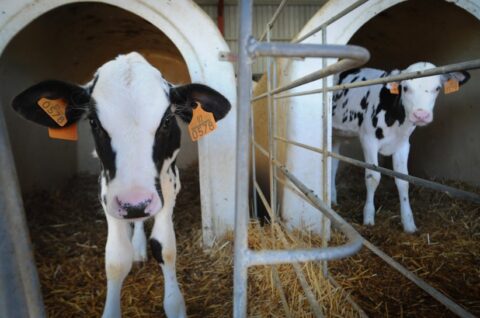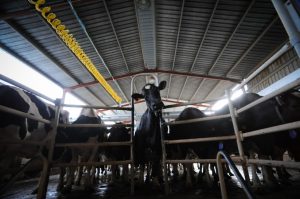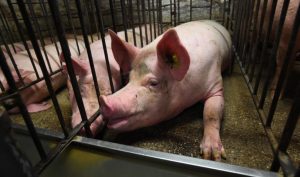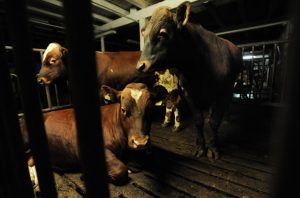Fact Check
Fact-Checking Claims Made About Oklahoma’s Lawsuit Against Tyson Foods
Food•5 min read
Explainer
The idea that we need to consume meat to remain healthy is a myth rooted in a culture with customs of eating meat and in an industry that wants to make money. Those two facts go hand-in-hand to support the meat industry.


Words by Grant Lingel
The meat industry impacts all of us, not just meat eaters.
When we’re shopping for groceries to feed our families, topics like the meat industry don’t usually enter our minds. Unless, of course, we understand how the meat industry impacts animal welfare, the environment, and our own health.
Too often, consumers simply follow the lifestyles their parents and grandparents before them led, never questioning the validity of their choices. Even if you have no interest in going vegan or vegetarian, learning about your dietary impact will make you a more educated consumer.
There’s no question that we need food to survive. Our bodies require nourishment. There is a question, however, about whether we need the meat industry. And the answer is, “No.”
Who needs the meat industry? The people who run the factory farming operations, slaughterhouses, transportation depots, and other parts of the food system.
If we view the meat industry in a different light, we can begin to change how we approach feeding ourselves and our families — and what it means to consume meat and animal by-products.

The meat industry is the enormous corporate system that commercializes animals as meat and other by-products. Animals like cows, chickens, pigs, and turkeys aren’t viewed as sentient creatures with lives to live, but as breasts, legs, thighs, flanks, and short loins.
Perhaps the best meat industry definition is a commercial system that includes raising, slaughtering, and transporting meat from farm to fork.
There are several meat industry problems, the largest of which is that it destroys the lives of animals who are bred and born for the specific purpose of slaughter. In other words, they’re not part of our natural ecosystem. They live and breathe on this earth for short periods of time just so we can make Aunt Sally’s chicken casserole.
Meat industry companies don’t raise and slaughter animals for fun. They’re making huge profits, which keeps the cycle going.
According to the North American Meat Institute, “The meat and poultry industry is the largest segment of U.S. agriculture.” It outperforms all other aspects of agriculture, from crop growing and harvesting foresting, fishing, aquaculture, dairy, and more.
The largest doesn’t mean the best, though. The meat industry is single-handedly robbing sentient creatures of their animal rights and creating a culture in which meat is the predominant item on most household menus.
How much is the meat and dairy industry worth? And how many animals die to supply the world with meat and animal by-products? Let’s look at some of the most revealing statistics.
The Meat Institute reports the most recent statistics on animals killed and meat produced. This is only for the United States, and most other countries have booming meat industries, as well.
According to the organization, the U.S. meat industry results in the deaths of:
WorldWatch reports that meat production and consumption is on the rise. Worldwide, pork is the most common meat among all peoples, and between 11 and 16 percent of deaths could be avoided if people reduced or eliminated red meat from their diets.
The meat industry statistics don’t lie. We’re consuming too much meat, animals are suffering as a result, and human health is at risk.
In certain parts of the world, such as Sub-Saharan Africa, meat constitutes the majority of people’s diets. This is largely due to availability; people who live in poor economic climates rural areas don’t have access to the abundance of foods available in industrialized parts of the world.
The United States is the meat-eating capital of the world, which should come as no surprise. Other countries with lots of meat eaters include Kuwait, Australia, and New Zealand.
On the flip side, many countries eat far more vegetarian diets. The most vegetarian country is Bangladesh, followed by India, Burundi, and Sri Lanka.
In the United States, according to the Meat Institute, people eat:
As you can see, the United States eats more beef than pork, in comparison to worldwide statistics.

Some of our meat-eating ancestors had little choice in the matter of whether to hunt and kill for their food. They were meat eaters because their nomadic lifestyles and choice of location didn’t afford them the ability to grow sufficient plants to feed their families.
However, they respected the animals they killed for meat and considered fruits and vegetables to be luxuries. They didn’t kill because they desired meat, but because they had few other choices.
Today, we have supermarkets and farmers’ markets full of meat alternatives. Meat is no longer essential to human health because we won’t starve without it.
Accepting that some of our ancestors needed meat to survive is one thing, but it’s entirely another to blanket the entire world with such a statement. In fact, one Himalayan tribe has practiced veganism for more than 5,000 years.
Furthermore, anthropologists have discovered that more of our ancestors were animal-friendly than we might think. Even Neanderthals might have eaten more plant-based foods than animal products, and since our guts are more closely aligned with apes and other monkeys, the comparisons to Homo erectus and the proliferation of the “paleo” diet aren’t as accurate as they seem at first glance.
The idea that we need to consume meat to remain healthy is a myth rooted in a culture that wants to eat meat and in an industry that wants to make money. Those two facts go hand-in-hand to support the meat industry.
For many years, the meat industry pushed people toward meat consumption by touting its healthfulness.
Fat is good! Protein is good! Let’s all grab a steak!
The meat industry claimed that we needed beef and poultry and pork to keep our guts healthy, to provide ourselves with sufficient protein, and to maintain muscle. Furthermore, the cultural ideal of hunting in the woods to provide food for the family still pervades many parts of the world today.
In other words, meat is either a marketer’s dream or a game.
It’s not just meat, either. Remember the commercials for the “incredible, edible egg”? That was pure marketing — designed to convince more people to buy eggs at the supermarket.
The marketing focused on the so-called health benefits of eating an animal’s eggs, but the meat industry has taken on far more compelling concepts to keep itself afloat.
It all comes down to dollars and cents, right? If someone can make money through a business concept, he or she will — or someone else will take that person’s place.
When a business sector, such as the meat industry, becomes large enough, the economic drivers begin to outweigh any other factor. The most basic rule of economics is supply and demand: If people want something, someone will create it for purchase.
The meat industry is no different. While people continue to eat meat and animal by-products, companies will continue to raise and butcher animals.
According to the Bureau of Labor Statistics, more than 80,000 people work in slaughtering and meat packing in the U.S. alone. That’s just one part of the meat industry.
This industry does create jobs, but at what expense? These workers earn a median wage of just over $27,000 per year in dangerous conditions. Slaughterhouse accidents and meat packing injuries are far from uncommon.
Exposure to harsh chemicals, dangerous machinery, and repetitive movements can cause moderate to severe injuries among slaughterhouse workers. Additionally, such injuries are considered underreported, not least because, in the U.S., many workers are undocumented.
Destroying the meat industry could actually result in more jobs. Those who would otherwise work in meatpacking, slaughtering, and similar roles could work on farms and cultivate plant-based foods.
According to the Meat Institute, federal, state, and local governments in the United States alone attract $81.2 billion in direct taxes from meat-related businesses and employers. An additional $2.4 billion comes from sales taxes at the state level.
Such revenues give governments little incentive to promote plant-based diets, create new laws to protect animals, or investigate slaughterhouses more closely.
The most recent statistics, which date back to 2013, demonstrate that the global meat and seafood industries produce $241 billion in U.S. dollars. No wonder companies continue to raise animals for the sole purpose of butchering them.
As mentioned previously, the demand for meat in certain countries, including the United States, has been on the rise. This leads to increased profits for meat industry companies and fewer incentives to improve factory farming conditions.
The good news is that technology might help offset the profits for meat companies. Clean meat, which is not yet on the shelves, could satiate humans’ desire for meat without harming any animals. Other advancements might reduce people’s dependence on meat for nourishment and turn them toward more plant-based foods.
We can’t deny that politicians favor industries from which they derive campaign donations. The most recent data reveals that, during the 2014 campaign cycle, meat industry companies donated a total of $1.7 million to federal political candidates. Tyson Foods, the number one meat processor in the United States, was the top donator.
This trend, combined with the revenue that governments derive from the meat industry, suggests that politicians are more likely to give meat processors and similar companies leeway in how they do business — and to promote meat eating in general.
We’re facing a severe crisis when it comes to animals in the United States as well as in many other countries. Instead of allowing them to contribute to the ecosystem in their natural habitats, we’re selectively breeding them and butchering them for food.
From dairy cows to farmed chickens, these animals face cruel lives from birth and often die long before they would in their natural environments. The animal raising slaughtering processes used in the modern world rob these animals of their dignity, their young, and their lives.
If you’ve never visited a factory farm, you might be shocked at what the housing conditions for animals look like. Smaller animals are kept in tiny cages or grouped together in pens so tightly they can’t move. Many go lame and fall down because they’re fed too many calories, and the larger animals stand in stalls or pens where they can’t move around or even lie down comfortably.
Most animals care for their young. This includes cows, chickens, and pigs. In the meat industry, however, mothers are separated almost immediately from their young, which denies them the chance to bond. Worse, the babies face the same horrendous conditions in which their parents lived.
Factory farmed animals have no say in their fate. They can’t fight for themselves or stop the cruel process that turns them into nothing but slabs of meat.
Dairy cows are forced into pregnancy over and over again until they’re crippled or until they suffer from severe disorders that prevent them from conceiving. These cows often don’t live past their fifth birthdays and, once they’re of no use to the farmers, they’re inhumanely slaughtered.
PETA and other organizations have posted investigative videos revealing how animals are treated in factory farms. We’ve seen beatings and torture, but somehow these practices continue.
Animals in factory farms aren’t valued for anything other than their meat, milk, or eggs. They don’t rate a kind word or a gentle touch, which means that they live and die in despair. Nobody wants that kind of life for an animal, yet the meat industry continues to thrive.

Numerous philosophers, humanists, and even economists have opined about the ability of money to distort our morals and corrupt our decisions. The meat industry is a prime example.
Maybe you eat meat many times every week. You love animals, including your pet dogs and cats, and you believe that animals are sentient creatures who deserve love and respect.
The practice of consuming animal products and the belief that animals are more than meat are incongruous. Some people rationalize that they don’t eat dogs or cats, but science proves that livestock are just as smart as our house pets.
If industries, businesses, governments, and citizens started advocating for the lives of animals, we could end the meat industry and shift our focus elsewhere. There are countless ways to generate income and revenue that don’t involve the cruel treatment and slaughter of a fellow creature.
Cows, pigs, chickens, deer, turkeys — none of these animals have ever done anything to harm us. In fact, they’re helpful. Chickens eat annoying insects, cows produce manure for farming, and so on.
Why, then, do we continue to treat them as commodities.
If dogs, cats, rabbits, hamsters, and guinea pigs are deserving of our love and respect, then so too are hogs, bulls, buffalo, and other animals that die at the hands of humans.
It’s true that the meat industry is stacked against us. They’re a powerful group of companies that produce generous revenue for our governmental systems. However, that doesn’t mean we can’t help save our animals.
Did you know that veganism is on the rise in the UK? So is vegetarianism. If you stop eating meat, consuming animal by-products, and buying products that have undergone animal testing, you can save these poor creatures.
Consider becoming more active online or, better yet, in your community. Become part of the animal rights movement and donate your money, time, or resources to these organizations. They need your help.
There’s no reason to slaughter animals for human consumption. Plant-based protein is more than enough to meet our needs, and veganism is an incredibly powerful way to take control of your health, improve your immune system, and treat your family to healthy, delicious recipes.
If we don’t commit ourselves to rescuing these animals one at a time, the meat industry will continue to flourish. Conditions on factory farms will worsen, animal rights will plummet, and governments will see no reason to protect our animals.
The best thing you can do is avoid consuming meat. Send a message with your wallet that you don’t condone animal torture.
What’s your biggest concern about the meat industry today?